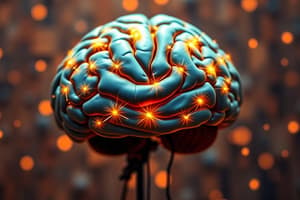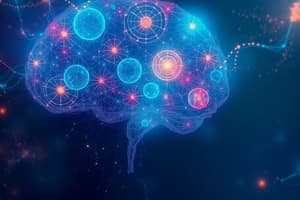Podcast
Questions and Answers
What is articulatory suppression?
What is articulatory suppression?
A technique for disrupting verbal rehearsal by requiring participants to continuously repeat a spoken item.
What is the central executive?
What is the central executive?
The component of working memory responsible for directing attention and managing cognitive processes.
Define conceptual implicit memory.
Define conceptual implicit memory.
Unconscious memory for the meaning of words or concepts, rather than their physical form.
What is consolidation in the context of memory?
What is consolidation in the context of memory?
What is the role of a cue in memory retrieval?
What is the role of a cue in memory retrieval?
What is declarative memory?
What is declarative memory?
What is deep level processing?
What is deep level processing?
Define directed forgetting.
Define directed forgetting.
What is direct suppression?
What is direct suppression?
What is a dual task paradigm, and why is it used?
What is a dual task paradigm, and why is it used?
What is echoic memory?
What is echoic memory?
What happens during the encoding phase of memory processing?
What happens during the encoding phase of memory processing?
What is the episodic buffer?
What is the episodic buffer?
Define ERP in the context of cognitive neuroscience.
Define ERP in the context of cognitive neuroscience.
What is explicit contamination in memory?
What is explicit contamination in memory?
What is free recall?
What is free recall?
What does fMRI measure?
What does fMRI measure?
Describe the generation effect.
Describe the generation effect.
What is hierarchical network theory?
What is hierarchical network theory?
Describe incidental learning.
Describe incidental learning.
What is inhibitory control?
What is inhibitory control?
Explain the Levels of Processing theory.
Explain the Levels of Processing theory.
Briefly describe the lexical decision task.
Briefly describe the lexical decision task.
What is motivated forgetting?
What is motivated forgetting?
What is perceptual implicit memory?
What is perceptual implicit memory?
What is the phonological loop?
What is the phonological loop?
What is the primacy effect in memory recall?
What is the primacy effect in memory recall?
Define priming.
Define priming.
What is procedural memory?
What is procedural memory?
What is the recency effect?
What is the recency effect?
Describe the remember-know procedure.
Describe the remember-know procedure.
What is retrieval?
What is retrieval?
Define schema in the context of memory.
Define schema in the context of memory.
What is shallow level processing?
What is shallow level processing?
Describe spreading activation theory.
Describe spreading activation theory.
What occurs during the study phase of an experiment?
What occurs during the study phase of an experiment?
What is the test phase of an experiment?
What is the test phase of an experiment?
Describe the Think/No-Think (TNT) procedure.
Describe the Think/No-Think (TNT) procedure.
What is thought substitution?
What is thought substitution?
What is the Translation Hypothesis?
What is the Translation Hypothesis?
What is TMS and rTMS?
What is TMS and rTMS?
What is working memory?
What is working memory?
What is the Visual Spatial Sketchpad?
What is the Visual Spatial Sketchpad?
Flashcards
Articulatory Suppression
Articulatory Suppression
Disrupting verbal rehearsal by repeating a spoken item.
Central Executive
Central Executive
Directs attention and manages cognitive processes in working memory.
Conceptual Implicit Memory
Conceptual Implicit Memory
Unconscious memory for the meaning of words or concepts.
Consolidation
Consolidation
Signup and view all the flashcards
Cue
Cue
Signup and view all the flashcards
Declarative Memory
Declarative Memory
Signup and view all the flashcards
Deep Level Processing
Deep Level Processing
Signup and view all the flashcards
Directed Forgetting
Directed Forgetting
Signup and view all the flashcards
Direct suppression
Direct suppression
Signup and view all the flashcards
Dual Task
Dual Task
Signup and view all the flashcards
Echoic Memory
Echoic Memory
Signup and view all the flashcards
Encoding Phase
Encoding Phase
Signup and view all the flashcards
Episodic Buffer
Episodic Buffer
Signup and view all the flashcards
Episodic Memory
Episodic Memory
Signup and view all the flashcards
ERP
ERP
Signup and view all the flashcards
Explicit Contamination
Explicit Contamination
Signup and view all the flashcards
Free Recall
Free Recall
Signup and view all the flashcards
fMRI
fMRI
Signup and view all the flashcards
Generation Effect
Generation Effect
Signup and view all the flashcards
Hierarchical Network Theory
Hierarchical Network Theory
Signup and view all the flashcards
Iconic Memory
Iconic Memory
Signup and view all the flashcards
Incidental Learning
Incidental Learning
Signup and view all the flashcards
Inhibitory Control
Inhibitory Control
Signup and view all the flashcards
Levels of Processing
Levels of Processing
Signup and view all the flashcards
Lexical Decision Task
Lexical Decision Task
Signup and view all the flashcards
Motivated Forgetting
Motivated Forgetting
Signup and view all the flashcards
Perceptual Implicit Memory
Perceptual Implicit Memory
Signup and view all the flashcards
Phonological Loop
Phonological Loop
Signup and view all the flashcards
Primacy Effect
Primacy Effect
Signup and view all the flashcards
Procedural Memory
Procedural Memory
Signup and view all the flashcards
Study Notes
- Study notes on key concepts in memory and cognitive processes
Articulatory Suppression
- Disrupts verbal rehearsal using continuous repetition of a spoken item.
Central Executive
- Directs attention and oversees cognitive processes within working memory.
Conceptual Implicit Memory
- Unconscious memory for the meaning of words and concepts, rather than physical form.
Consolidation
- Memory traces are gradually woven into the fabric of memory.
- Components and interconnections are cemented together over time.
Cue
- Retrieval cue specifies encoding conditions, incorporating the location and the timing of the event.
Declarative Memory
- Memory of consciously recalled facts and events, featuring semantic and episodic memory.
Deep Level Processing
- Focus is on meaning and connections, rather than surface features during encoding.
Directed Forgetting
- Induces memory impairment via instructions to forget recently experienced items.
Direct Suppression
- Actively inhibits thoughts or memories in order to prevent retrieval.
Dual Task
- Cognitive research tool tests resource allocation by performing two tasks simultaneously.
Echoic Memory
- Term applied to auditory sensory memory.
Encoding Phase
- Information is initially learned and stored.
Episodic Buffer
- Connects short-term and long-term memory.
- Facilitates integrated information processing across domains.
Episodic Memory
- Underpins the ability to remember particular specific events.
ERP (Event Related Potential)
- EEG activity resulting from averaging brain responses to the same or similar stimuli presented repeatedly.
Explicit Contamination
- External factors alter a person's explicit memory, such as misleading information.
Free Recall
- Items presented in a sequence are recalled in any order.
fMRI (Functional Magnetic Resonance Imaging)
- This neuroimaging technique detects alterations in blood flow to gauge brain activity.
Generation Effect
- Memory improves when information is actively generated versus passively received.
Hierarchical Network Theory
- Memory is organized within a structured hierarchy of concepts.
Iconic Memory
- Term applied to the brief storage of visual information.
Incidental Learning
- The learner is not informed of any upcoming tests.
Inhibitory Control
- Suppresses automatic responses or distractions for better goal focus.
Levels of Processing
- This model theorizes more deeply processed items are better remembered.
- Proposed by Craik and Lockhart.
Lexical Decision Task
- Quickly decide if a string of letters makes a word.
Motivated Forgetting
- Avoidance of recalling information due to a desire to forget the memory.
Perceptual Implicit Memory
- Unconscious memory for physical stimulus characteristics.
- Recognizing a familiar shape.
Phonological Loop
- Baddeley and Hitch's model component for temporary storage of speech-like info.
Primacy Effect
- Initial items in a sequence are better recalled than subsequent items.
Priming
- Presentation of an item impacts processing of a subsequent one.
- Making it easier (positive) or harder (negative).
Procedural Memory
- Implicit memory of motor skills and habits.
- Riding a bike.
Recency Effect
- Final items on a list are easily recalled.
Remember-Know Procedure
- Test to determine remembering with details or recognition/familiarity.
Retrieval
- Recovering a target memory with cues, bringing it to awareness.
Schema
- Explains how world knowledge is organized.
- Influences new information storage and recall through prior knowledge.
- Proposed by Bartlett.
Semantic Memory
- Accumulative knowledge of our world is stored.
Shallow Level Processing
- Encoding focuses on surface features like appearance or sound, not meaning.
Spreading Activation Theory
- The activation of one concept triggers related concepts in memory.
Study Phase
- The initial learning stage of material in an experiment.
Test Phase
- Assessment of previously learned material.
Think/No-Think (TNT)
- Voluntarily suppress retrieval of a memory while facing reminders.
Thought Substitution
- Replace an unwanted thought with a neutral or positive one.
Translation Hypothesis
- Working memory converts visual and auditory info towards a common code.
TMS (Transcranial Magnetic Stimulation)
- Disrupts brain area function with magnetic pulses; repetitive pulses are rTMS.
Working Memory
- Enables keeping things in mind during complex tasks.
Visual Spatial Sketchpad
- Baddeley and Hitch model component maintains visual and spatial data temporarily.
Studying That Suits You
Use AI to generate personalized quizzes and flashcards to suit your learning preferences.




